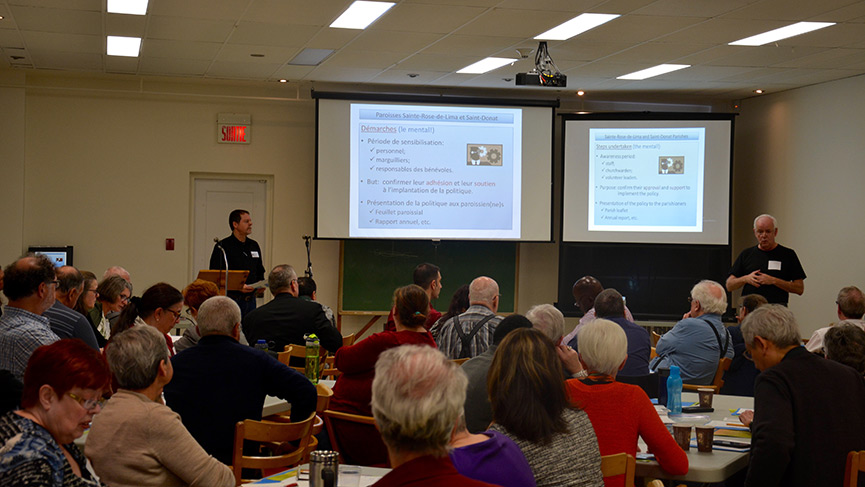Forging connections to strengthen responsible pastoral ministry

Montreal
Auxiliary Bishop Alain Faubert, V.G., of Montreal, welcomed those gathered Dec. 14 at the diocesan offices for a day of reflection and fellowship: “In the name of the Lord, thank you for your presence. In the name of children and vulnerable people, thank you.”
The gathering had been organized under the coordination of the Responsible Pastoral Ministry Office. The goal was not to offer training on responsible pastoral ministry, but rather to take time to reflect on the spiritual renewal and to do some networking with parish coordinators in charge of the responsible pastoral ministry. It was a first!
“Responsible pastoral ministry? What’s that?”
The responsible pastoral ministry is a diocesan policy that was introduced to ensure human dignity, and to protect the physical and psychological integrity of those who benefit from the pastoral services given by the Catholic Church of Montreal.
The measures implemented through this policy aim at preventing all forms of abuse toward vulnerable people, and to ensure the safety and well-being of all the employees and volunteers involved in the Church.
“How do we stand on this? How do we stand, in the Church, on all of this? How can we stand as brothers and sisters in this great undertaking?” asked Bishop Faubert in his introduction. “This morning, I would like you to realize through our discussions that what you accomplish is part of a great undertaking, and that this undertaking is not only a diocesan worksite. Evangelizing is, in fact, what it is all about.” Quoting Archbishop’s Lépine last September letter on the diocesan worksite, Bishop Faubert reminded the assembly that the responsible pastoral ministry is there “not only to prevent, but also to heal and to guide, and to transform the world—right here!”
“It is our hope that through our active listening, transparency and prevention will eradicate this not only from the Church but also from society, from all situations involving crime and abuse. I am convinced that listening honestly to the suffering we experience will help us to listen to the suffering of our world.” (Archbishop Lépine, September 2019)
“We are building a cathedral, a human cathedral, a place where God feels good, where everyone feels good,” said Bishop Faubert with emotion. “My hope is that you, as coordinators, are convinced that you are bringing into the world a vision filled with dignity,” he added.
How to Implement a Responsible Pastoral Ministry
Two responsible pastoral ministry coordinators from Saint-Donat and Sainte-Rose-de-Lima parishes shared their experience, some tips and the challenges they encountered during the implementation, as well as the benefits in parishes. The participants gathered gained from the richness of their stories.
Discussions were held in small groups to evaluate the implementation in various parishes and the issues that arose. It was the perfect opportunity for all the coordinators that were there to let go of their fears, to envision a step-by-step scenario and, most of all, to understand they are not alone in this process.
The diocesan responsible pastoral ministry team reminded the assembly that all coordinators can count on their support because they are at their service.
Among the 191 parishes in the Archdiocese of Montreal, about 156 had been covered or contacted at this point in time. Less than 35 need to be contacted by June 2020.
To know more about the responsible pastoral ministry, please go to:
https://www.diocesemontreal.org/fr/archidiocese/pastorale-responsable
To know more on the implementation of the policy in the parishes of the Archdiocese, please go to:
https://www.diocesemontreal.org/fr/actualites/nouvelles/la-pastorale-responsable-laffaire-de-tous

Comment
0 Comment
Add new comment